Tunisia and Implications for Political Change in the Middle East
By INEGMA and Daniel Wagner
By Daniel Wagner, Non-Resident Scholar, INEGMA
Now that the world’s first social media ‘revolution’ has unseated one of the Middle East’s strongest and longest serving dictators, many of the region’s leaders must be asking themselves whether they could be next. Tunisia’s story remains a work-in-progress, since former President Ben Ali’s instruments of power (the Constitutional Democratic Rally (RCD) party, military, and police) remain in place. Given the fast pace of change, this is not likely to remain the case in the near term; Tunisia’s people did not rise up against Ben Ali as quickly or vociferously as they did to leave the remnants of his government at the helm. Yet, the notion that last week’s events will somehow trigger a domino effect throughout the region seems unrealistic.
The question of whether decades-old regimes will now crumble implies that a) this is what a country’s people actually want, and b) they have the will to do so. The Middle East thrives on stability, despite or perhaps because of its undemocratic underpinnings. As long as the region’s governments deliver the basic services their citizens require, there is little inherent incentive for them to rise up. Even if there were an incentive for them to do so, it is reasonable to ask whether they willing to risk what they have for the hope of achieving something better in the long-term.
It can certainly be argued that citizenries that have only ever known one party or one-person rule will be hesitant to embrace change, and even if they were given an opportunity to participate in a genuinely democratic vote, the fact that it would be for the first time in many Middle Eastern countries, raises doubt about whether voters would truly vote their conscience. As the recent democratic experiment in Iraq has demonstrated, the process can be highly politicized, and remnants of long-established political forces can clash with new political forces for many years before the dust settles and the benefits of change become apparent. Political change implies uncertainty and the average person is less likely to risk stability for an uncertain future.

The Middle East’s remaining governments are undoubtedly considering what they must do to prolong their time in power. Their ability to be perceived to be providing meaningful basic services may in large part determine how long they can remain in power. The region’s oil-rich governments are in a uniquely strong position to be able to enhance the provision of basic services because the price of oil has stabilized at a high level. Given that production costs in the region are generally below $40 per barrel, that the price of oil currently trades at around $90 per barrel, and that it is projected to exceed $100 per barrel this year, current and medium-term revenues give these governments options they may not otherwise have to ensure that basic needs are met. They certainly have an even greater incentive to do so now.
If the Tunisian example is any guide, they have a lot of work to do. Ben Ali was ultimately driven out of power by a chain of events originating in Sidi Bouzid, in the country’s western center. According to the World Bank, this part of Tunisia had the highest rate of poverty in the country between 1990 and 2000. The people in Sidi Bouzid had little to lose by promoting political change once an opportunity was created. But the reason that the suicide of food cart vendor Muhammad Bouazizi triggered the riots and Ben Ali’s subsequent departure is that opposition groups, trade unions, and much wealthier parts of the country became galvanized — they were collectively tired of being oppressed, too many of them were unemployed, and Ben Ali’s family had enriched itself too grotesquely for too long.
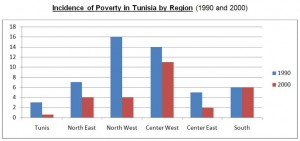
Tunisia had been neither the worst nor the best at providing basic services to its people. As noted in the charts that follow, the country was either at or above average for lower-middle-income countries in the region with respect to total spending on education between 1980 and 2000. But its spending on education actually declined or remained stagnant during the 1980s and 1990s. Tunisia was again an average performer in terms of health expenditures as a percent of GDP, and one of the better regional performers in terms of health expenditures per capita. The Tunisian government provided free or subsidized health care to its lowest income groups, but the percentage of GDP the government devoted to food subsidies declined by more than half between 1989 and 1999, in the first decade of Ben Ali’s reign.
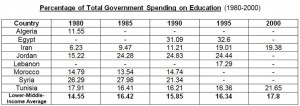
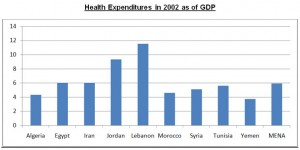
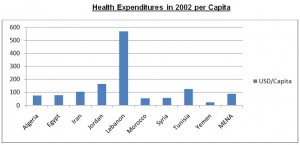

So, Tunisia had done neither particularly well nor particularly badly in looking after the basic needs of its people in recent history. Tunisia’s GDP per capita has risen notably over the past 50 years, reaching US$3,800 by 2009 – at the top of the World Bank’s classification for lower-middle-income countries – albeit well below the global average. That the country is well integrated with Europe both from a business and tourism perspective, has meant that the financial crisis hit Tunisia harder than other, less well integrated countries in the region. This undoubtedly raised the level of common dissatisfaction with the Ben Ali regime.
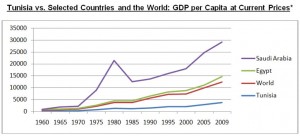
Had the Tunisian masses been given greater freedoms, and had the state not held such a vice-like grip on power, the spark that occurred in Sidi Bouzid may not have turned into a bonfire. Tunisia under Ben Ali had been a police state virtually since Ben Ali assumed power in 1987, with a security apparatus that came to be larger than that of France, six times its population. With unacceptably high unemployment rates throughout the Middle East and millions of young people yearning for a greater voice, the potential for a similar backlash certainly exists, particularly in Algeria, Egypt, Libya, and Jordan.
What may happen in these and other countries depends only to a limited degree on what happens next in Tunisia. While many of the region’s governments will make a more visible effort to appeal to the common citizen through enhanced public services, food and petrol subsidies, and more funding provided for education, it seems unlikely that any of these governments will release their own vice-like grips on power. What is likelier to happen is that, in anticipation of a Tunisia-like event, they will implement martial law or restrict freedoms even further. Indeed, given the modern history of the region’s most autocratic governments, this is almost certainly the unfortunate path they will choose to take.
Tunisia will not be the last social media-inspired change of power. What would be much smarter is for these governments to gradually release their grip on power over time while making genuine overtures to demonstrate that they are open to changing their tune. If the masses see the door open a crack, their temptation to force it open will be reduced. That is really the only hope the autocratic governments in the region have of remaining in power over the long-term.

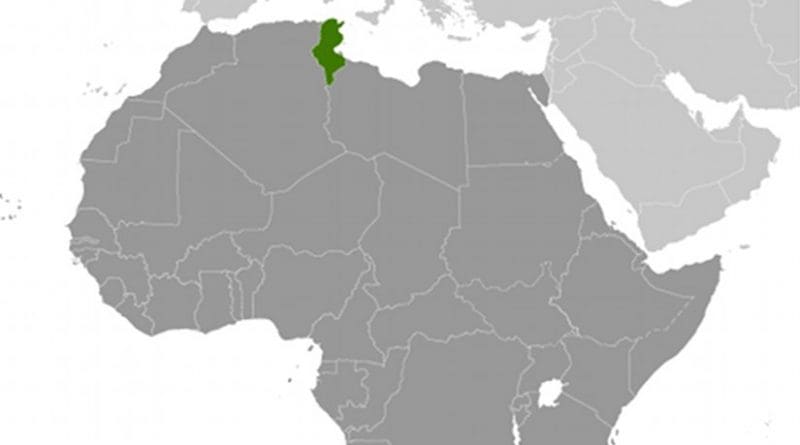
Pingback: Tunisia and Implications for Political Change in the Middle East – Eurasia Review | PAULitics - Wake Up America